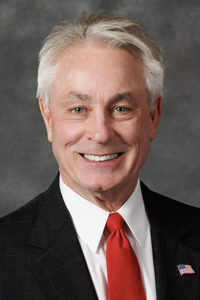Bill would reinstate winner-take-all electoral system
All five of Nebraska’s Electoral College votes would be assigned to the statewide winner in presidential elections under a bill considered March 15 by the Government, Military and Veterans Affairs Committee.

LB764, sponsored by Central City Sen. Loren Lippincott, would end Nebraska’s split system of awarding electoral votes, in place since 1991. Currently, the statewide winner receives two electoral votes and the winner of each of the state’s three congressional districts receives one electoral vote. Nebraska and Maine are the only two states to use this system.
Lippincott said measures have been introduced to return to winner-take-all since the year after Nebraska moved to the new system — also called the district plan. Two of those proposals passed the Legislature but were vetoed by then-Gov. Ben Nelson, he said.
The current system gives rural voters less of a voice in presidential politics, Lippincott said.
“The district plan, what we have now, discourages candidates from discussing issues that appeal to the state as a whole by rewarding candidates who visit our congressional districts with higher populations and income levels to the exclusion of rural Nebraska,” he said.
Nebraska Secretary of State Bob Evnen testified in support of the proposal, saying a return to the winner-take-all system would allow Nebraska voters to speak with one voice. The statewide winner of the 2020 presidential contest garnered 182,000 more votes than the loser, he said, but only earned four of the state’s five Electoral College votes.
“We are not playing by the same rules as the other states in the union and we ought to,” Evnen said, “because our failure to do so dilutes Nebraska’s Electoral College presence.”
Steve Davies also testified in favor of LB764, saying it would “level the playing field” for Nebraska. The possibility of splitting the state’s electoral votes makes Nebraska less valuable to presidential candidates, he said.
Sheri St. Clair testified in opposition to the proposal. The district plan was adopted in an attempt to attract candidates to a solidly conservative state that otherwise would be ignored in presidential elections, she said.
“In reality, in all likelihood a presidential race is not going to be so close that a single electoral vote is going to decide the outcome, but it’s important for campaigns to compete everywhere that’s competitive,” St. Clair said. “The split vote system does keep Nebraska from being a completely ‘fly-over’ state.”
Gavin Geis of Common Cause Nebraska agreed. Testifying in opposition to LB764, he said a return to winner-take-all would give Nebraska less influence in presidential elections. No other Great Plains state is regularly visited by candidates, he said, because they have nothing to gain electorally in winner-take-all races.
“The possibility of a split Electoral College vote brings them here,” Geis said. “It makes them sell themselves to us.”
The committee took no immediate action on the proposal.

